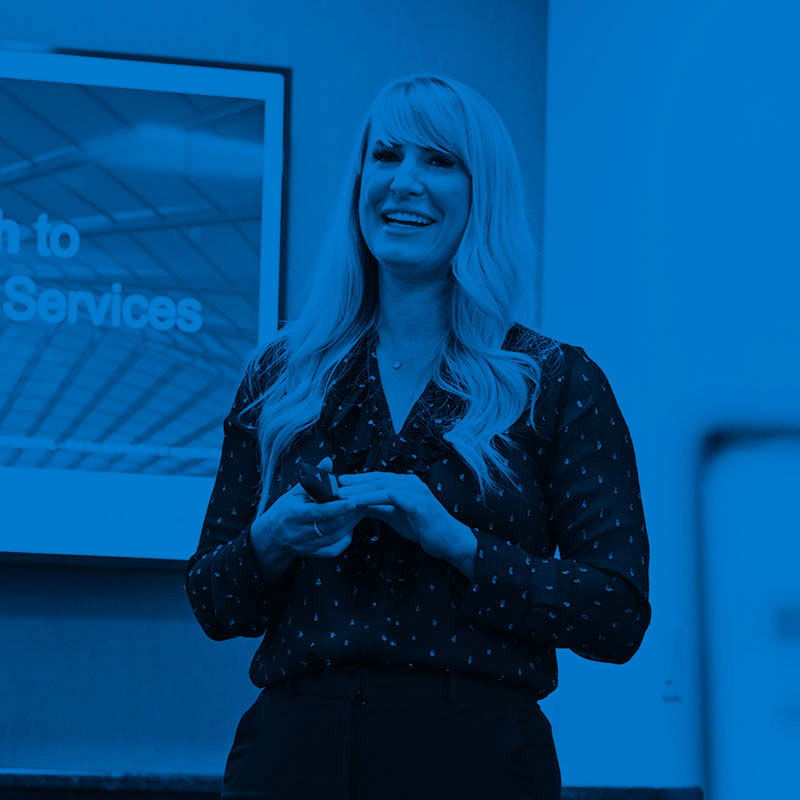Why Earn a Master of Arts in Counseling Psychology at Etown SGPS?
Earning a Master of Arts (M.A.) in Counseling Psychology from Elizabethtown College SGPS is an excellent choice for those looking to excel in mental health practice. The program's unique blend of evidence-based practices and multicultural competencies ensures graduates are well-prepared for diverse counseling roles. Specializations in Child & Adolescent Counseling, Substance Use Counseling, or a Generalist track allow for focused expertise, enhancing your professional flexibility and impact. As part of the degree program, students complete 700 hours of practicum and internship training, opening doors to a variety of counseling opportunities.
Additionally, prospective and current Elizabethtown College undergraduate psychology students may be eligible for admission to two pipeline programs. Students in the pipeline programs benefit from early provisional acceptance to the graduate program, a waived graduate program application fee, and a 15% tuition discount on graduate courses.
Program Outcomes:
- Knowledge and Practice of Evidence-Based Counseling Theory and Practices: Demonstrate knowledge of individual and group theories and practices of counseling and psychotherapy. Relate and communicate effectively with clients, supervisors, and professionals, and apply evidence-based intervention and prevention strategies for the promotion of wellbeing and alleviation of suffering.
- Professionalism and Ethical Standards: Demonstrate knowledge and application of ethical and professional standards. Integrate and display ethical values and attitudes in professional conduct. Demonstrate understanding and appropriate use of and response to supervision during applied experiences.
- Critical Inquiry and Assessment: Understand the use of scientific methods to evaluate clinical work, programs, interventions, and the expansion of the counseling knowledge base. Become familiar with the strengths, limitations, and applications of tests, measurements and assessments used by counselors and other mental health professionals. Develop ability to critically evaluate and utilize published research.
- Understanding of Contribution of Broad Knowledge Bases (Development, Biology, Career Theories) to Counseling: Demonstrate knowledge and understanding of the role of work in people’s lives, the relationship between biological factors and human functioning, and human development across the lifespan. Integrate these varied knowledge bases into understanding of psychopathology, case conceptualization, and treatment.
- Multicultural Knowledge and Competency: Demonstrate self-awareness and competency in working with individuals, groups, and communities who represent varied cultural backgrounds and characteristics. Demonstrate knowledge and understanding of the interaction between person and environment (including culture, social norms, institutions, and policies), and understanding of the self as shaped by age, gender, gender identity, race, ethnicity, culture, national origin, sexual orientation, ability, language, and socioeconomic status. Apply this knowledge to foster social justice and advocate for equity in varied practice settings.
For a full explanation of the curriculum including course descriptions, please visit the course catalog.
Program Format and Timeframe
Program Format
The Elizabethtown College Master of Arts in Counseling Psychology (MCP) Program operates in a hybrid format. Most of the classes (75% of the curriculum) are scheduled in the evenings starting at 6 p.m., with meetings taking place in a live, synchronous format. Most of these class meetings are virtual; in-person meetings at the Elizabethtown, Pa. campus take place approximately once every 1-2 weeks. The remainder of classes (25% of the curriculum) are delivered in an online, asynchronous manner. Thus, students should live within a reasonable driving distance of campus as they can expect to be on campus approximately once every 1-2 weeks (or slightly less frequently in the three-year program timeframe).
Timeframes for Completion
Starting in the 2025-2026 academic year, there will be two timeframes for MCP program completion:
Two-Year Timeframe
Complete your master’s degree in 2 years (6 semesters, with classes in fall, spring, and summer). The first year consists of entirely coursework, and the second year includes coursework and 700 hours of on-site clinical training. This is a good option for students seeking to accelerate their degree completion.
Three-Year Timeframe
Complete your master’s degree in 3 years (9 semesters, with classes in fall, spring, and summer). The first two years consist entirely of coursework, and the third year includes 700 hours of on-site clinical training alongside one additional class per semester. This is a good option for students seeking to pace their degree completion.
Undergraduate Pipeline Programs
- 3+2 B.S. in Psychology and M.A. in Counseling Psychology Pipeline Program: This accelerated, combined program allows eligible students to complete their B.S. in 3 years, with provisional acceptance to the 2-year M.A. in Counseling Psychology Program. Students in this program complete undergraduate courses at an accelerated rate and in the summer/winter terms.
- 4+2 B.S. in Psychology and M.A. in Counseling Psychology Pipeline Program: This combined program allows eligible students to complete their B.S. in Psychology in 4 years, with provisional acceptance to the 2-year M.A. in Counseling Psychology Program.
What Career Opportunities Could I Have With an Master of Arts in Counseling Psychology Degree?
Graduates of the Master of Arts in Counseling Psychology from Elizabethtown College have a wide array of career opportunities in a fast-growing industry. The program opens doors to roles such as Mental Health Counselor, Child and Adolescent Counselor, Substance Use Counselor, and Group Therapist. With the job growth rate in Counseling Psychology projected to be much faster than average, especially in substance abuse and mental health counseling, graduates can expect a robust job market with competitive entry-level wages. Pennsylvania, in particular, holds a high volume of employment opportunities in this field.
Every faculty member for the MCP program is incredibly understanding of all of the things we juggle as graduate students. They are always encouraging us to take time off when necessary, and to do whatever possible to avoid burnout. It is so nice to know that people who are teaching about mental health practice what they preach!
Understand Tuition Costs and Explore Scholarship and Financial Assistance Opportunities
The M.A. in Counseling Psychology is priced at $695 per credit and the program consists of 60 credits. Scholarships and financial aid are available to make your Etown SGPS education even more affordable. Below are just a few of the scholarships and programs available to students:
- Alumni Scholarship: 15% tuition discount, available to Elizabethtown College alumni.
- Affinity Partner Scholarship: 15% discount, offered to employees of organizations partnered with Etown SGPS.
- Jay Fellowship Referral Program: This is a referral program that benefits both current students/alumni and prospective students. When a student or alum refers a new student, both the referrer and the referred student receive a complimentary credit for their program of interest.
- Additional Scholarships for Adult Learners: Discover scholarship opportunities designed to support adult learners in achieving their academic goals. View more information on Scholarships for Adult Learners.
-
On-Campus Student Employment and Graduate Assistant Positions: Elizabethtown College offers opportunities for student employment and occasionally has opportunities for Graduate Assistant Positions, pending open positions and funding. Information about institutional student employment opportunities and Graduate Assistantships, including specific job descriptions, application instructions, and position criteria, are posted on the applicant portal for current/accepted students as they become available. Graduate assistant and other student employment opportunities vary in job qualifications but are generally determined on the basis of students’ interests and relevant experience and skills (e.g., prior work and academic experience).
Graduate Assistant Positions are typically accompanied by some amount of tuition remission (specific amount depends on hours associated with the role) in addition to an hourly wage. Graduate Assistant Positions are not guaranteed, and applications are typically competitive. While most institutional Graduate Assistant Positions are open to all graduate students at Elizabethtown College, there are occasional Graduate Assistant Positions for counseling graduate students specifically, such as serving as a teaching assistant to the undergraduate psychology and neuroscience program.
Tuition and fees are reviewed and subject to change annually.
Tuition & AidMaster of Arts in Counseling Psychology Requirements
The M.A. in Counseling Psychology at Elizabethtown College requires 60 credit hours of academic work and completion of 700 hours of supervised practicum and internship experience. Students have the opportunity to specialize in Child & Adolescent Counseling, Substance Use Counseling, or pursue a Generalist Concentration. Additional requirements and benchmarks, including achieving a 3.0 or higher GPA and maintaining professional behavior standards and expectations, are outlined in the Course Catalog.
As part of the M.A. in Counseling Psychology program, students will complete 100 hours of practicum-level training and 600 hours of internship-level training. In total, students must accumulate 700 hours of counseling experience over the year-long (three semester) experience, 280 of which are direct service hours. Throughout the practicum and internship experience, students are supported by their on-site, licensed supervisor and meet weekly with a faculty instructor in the corresponding practicum/internship course.
The MCP Director of Clinical Training works closely with students to support them in finding site placements that fit their professional and training goals as well as geographic preferences. While many students have secured placements in and around Lancaster County, PA, MCP students have also completed their training in areas closer to their homes including in the greater Philadelphia region, New Jersey, Maryland, and Delaware. Students have completed their training at a variety of settings, including community mental health centers, hospital-based settings, private practices, substance use treatment clinics, and college and university counseling centers.
Showcase Your Achievement
Upon completing the program, you’ll receive a digital Credly badge — a verified credential that recognizes your accomplishment. Credly will email you with instructions on how to accept and share your badge. You can easily add it to your LinkedIn profile, resume, or any platform where you want to highlight your achievements.
For questions, contact the School of Graduate and Professional Studies.
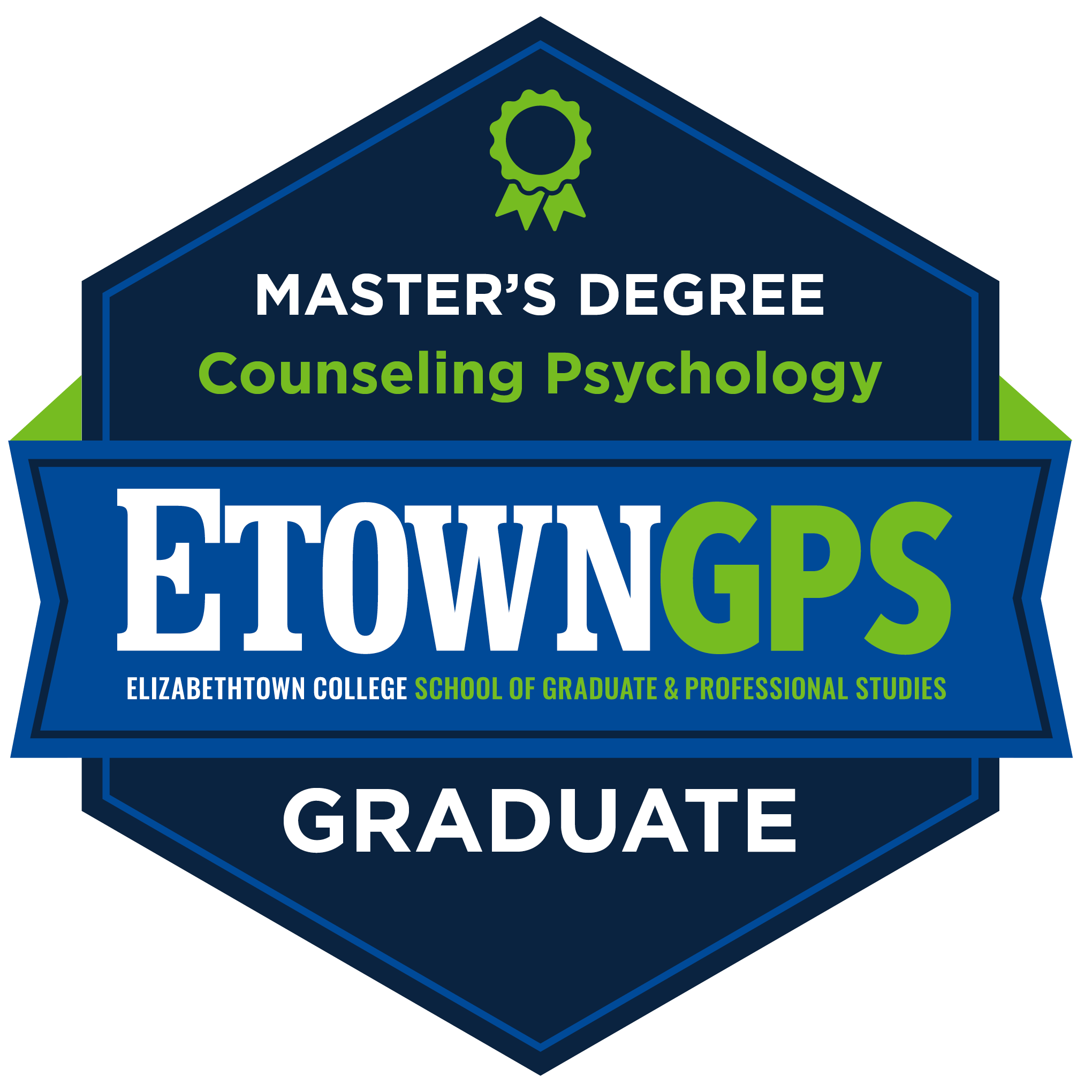
Licensure Information and Faculty & Student Research
Licensure Information
Elizabethtown College’s Master of Arts in Counseling Psychology program is developed in accordance with the educational training requirements for licensure as a Licensed Associated Professional Counselor (LAPC) and Licensed Professional Counselor (LPC) in Pennsylvania. Additional non-educational training requirements, including passing a certifying examination (such as the National Counselor Examination) and additional hours of supervised professional experience after completion of the graduate degree (in Pennsylvania, 3000 hours are required), apply to obtain LPC licensure.
For further information regarding Licensed Professional Counselor requirements in Pennsylvania, please visit the Pennsylvania State Board of Social Works, Marriage and Family Therapists, and Professional Counselors website. Students who seek similar credentialing in states other than Pennsylvania are advised to contact the credentialing board or agency in those states, as other requirements may exist.
State Professional and Licensed Boards: This list of state regulatory boards is maintained by Elizabethtown College and updated annually. Thus, they may not represent the most current policies for the specified states. Students are ALWAYS advised to check with the specific state to verify the current licensure standards, policies, and requirements of the state.
Faculty & Student Research
Students in the program are trained to critically evaluate and apply research to counseling practice. Students are not required to complete their own independent research but are welcome have opportunities to do so if desired. Recent graduate student-faculty research collaborations have included, for example, co-authored chapters in the Sage Encyclopedia of Mood and Anxiety Disorders (Foose and Dalton, 2024) and research on the effects of psychology coursework on undergraduate students’ perceptions of stress (Dalton & Fickes, in preparation). For more information about faculty research interests and ongoing research projects, contact Dr. Dalton.
Meet the Faculty
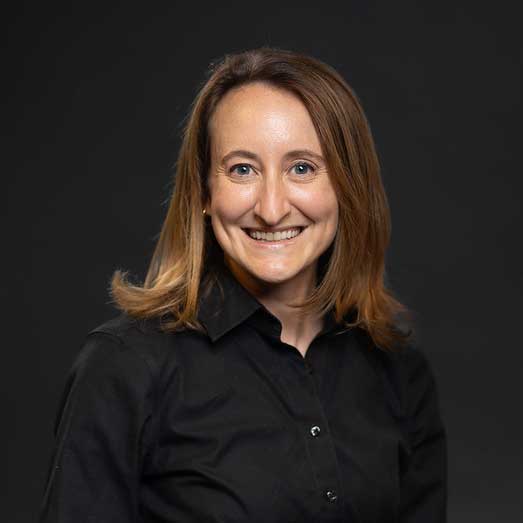
Elizabeth Dalton, Ph.D.
Associate Professor of Psychology
Program Director, Counseling Psychology
daltone@etown.edu |
717-361-1332
Dr. Liz Dalton is a Pennsylvania licensed clinical psychologist with clinical and research interests in mood disorders, stressful life events, and health psychology. Liz earned her Ph.D. in Clinical Psychology from the University of California, Los Angeles, and completed her clinical internship at New York Presbyterian Hospital/Weill Cornell Medical Center. Liz has worked at Elizabethtown College since 2017 and is highly committed to the College’s motto of Educate for Service. Liz is passionate about supporting students in the development of their professional interests and identities.

Jihan Owens-Tyler, M.S., LMFT
Assistant Teaching Professor
owenstylerj@etown.edu |
717-361-3596
Master's in Clinical Counseling and Psychology
Jihan is a Lecturer in Counseling Psychology. Jihan holds a master’s degree in Clinical Counseling and Psychology from Chestnut Hill College and is a Licensed Marriage and Family Therapist. Much of Jihan’s career has been committed to providing treatment and services to underserved populations. Jihan has worked with various populations ranging in age, mental health diagnoses, and levels of care. Jihan’s clinical training has encompassed various therapies, including prolonged exposure and CBT. Jihan has extensive experience working with clients presenting with anxiety, depression, familial issues, trauma, and post-traumatic stress disorder. After working at Rogers Behavioral Hospital, she gained significant expertise in working with clients dealing with OCD and ASD, as well as their families. Jihan is currently enrolled in Drexel University’s Doctorate of Couple and Family Therapy program. When not working, Jihan is spending time with her husband and two children, family and friends or doing Zumba!
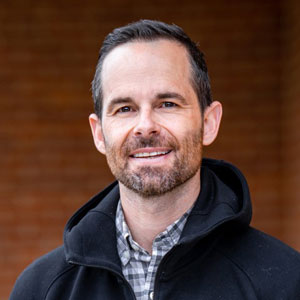
Mike Shook, M.A.
Assistant Teaching Professor & Director of Clinical Training
shookm@etown.edu |
717-361-1328
M.A. in Clinical Mental Health Counseling
Mike is a licensed professional counselor in both Pennsylvania and Florida and holds a master’s degree in clinical mental health counseling from Palo Alto University. Additionally, Mike is a National Certified Counselor and Board Certified-TeleMental Health Provider and has advanced training in Feedback Informed Treatment, Narrative Practice, and relational approaches to suicidality. Mike has served as adjunct faculty in Palo Alto University’s Mental Health Counseling program and currently serves on the Lancaster County Suicide Prevention Coalition. He is the creator and founding editor of The Thoughtful Counselor podcast which hosts in depth conversations related to counseling and counselor education. As a practicing counselor, Mike works with youths, adults, couples, and families. He has worked in a variety of settings and with a range of concerns, including struggles with anxiety, depression, bipolar disorder, suicidality, burnout, cross-cultural stress, relational and marriage issues, and serious mental illness.
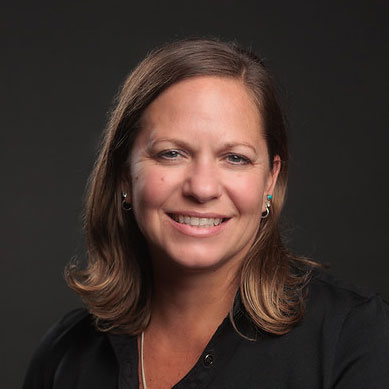
Jennifer Deitz, M.S.
Adjunct in Counseling Psychology
Jennifer is a Pennsylvania licensed professional counselor and Assistant Director for Student Counseling and Health Needs at Elizabethtown College. Jennifer has worked in a variety of clinical settings, including psychiatric residential treatment facilities, drug and alcohol treatment programs, universities, and outpatient clinics. Jennifer earned her undergraduate and graduate degrees from Shippensburg University, majoring in psychology, minoring in Anthropology, and later receiving her master’s degree in Clinical Mental Health Counseling. Jennifer specializes in working with young adults, college students, those who have experienced trauma, and the LGBTQIA+ Community.
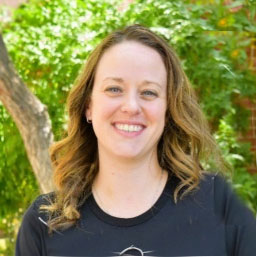
Valerie Minnich, M.S., Ph.D.
Adjunct in Counseling Psychology
minnichv@etown.edu |
717-361-1383
M.S. in Professional Counseling, Ph.D. in Human Cognition and Instruction
Dr. Valerie Minnich is a Pennsylvania licensed professional counselor with an emphasis in marriage and family counseling from Grand Canyon University. She primarily works with teens, adults, and couples. Dr. Minnich earned her B.A. in Psychology from Shippensburg University, where she also studied Elementary Education for 3 years. Her Ph.D. is from Grand Canyon University and her dissertation research is on Millennial Faculty's job satisfaction and self-efficacy beliefs. Dr. Minnich has an unofficial pre-medicine B.S. degree and a year of Naturopathic Medical School completed. She believes in a holistic approach to healing humanity incorporating the mind, body, and spirit into her work. Dr. Minnich supervises interns and individuals seeking clinical licensure in Pennsylvania at a local non-profit as the Training Director and ran a youth mental health education and screening program as a Clinical and Program Director and lead Research Coordinator with the same agency. She works for the National Board of Certified Counselors as a Subject Matter Expert working on the National Counselor Exam and teaches multiple cohorts of master-level counselors in training through practicum to internship II. Dr. Minnich is passionate about growing and supporting students and novice professionals on their journey to becoming licensed clinicians.

Cori Reed, M.A.
Adjunct in Counseling Psychology
reedcori@etown.edu |
717-361-1714
M.A. in Child & Family Studies
Cori Reed is a licensed professional counselor and a licensed behavior specialist in Pennsylvania. She has a Bachelor's degree in Psychology from Elizabethtown College, and a Master's degree in Child & Family Studies from Syracuse University. Cori's areas of interest include trauma-informed care, DEIB, the mental health of children, adolescents, and families, as well as the education and empowerment of students and professionals entering the mental health field.
Application Requirements & Process
- Bachelor's degree from a regionally accredited college or university.
- An undergraduate GPA of 3.0 or higher on a 4.0 scale (applicants with a lower GPA will be considered on a case-by-case basis)
- Graduate Record Examination (GRE) scores are not required, but may be submitted for consideration.
- An undergraduate degree in Psychology or a related field is not required, however, preference will be given to applicants who have taken at least three psychology or equivalant courses and earned a grade of "B" or better in each.
-
Complete the graduate application via the online portal which includes the submission of a $50 nonrefundable application fee, waived for Elizabethtown College graduates.
- You will need to request your official transcript from the undergraduate institution that conferred your bachelor’s degree and upload your current resume.
- Additionally, prepare a personal statement addressing your academic and professional goals, and preparation and motivation to attend graduate school.
- The application process also requires two recommendations. Please include letters from those who can speak to your educational and professional experience. Instructions for these are available in the admissions portal.
- Selected applicants will be invited to complete an interview. Final admissions decisions will be determined after the interview. We take a holistic approach to application review and will review all completed applications received.
- If you have any questions or concerns about whether you meet our application requirements please do not hesitate to reach out to either MCP Program Director Elizabeth Dalton or Associate Director of SGPS Admissions Don Sharples.
Completed applications submitted by the priority deadline (see application timeline section below) will be reviewed by the admissions review team (which generally consists of members of the SGPS Admissions Team, the MCP Program Director, and MCP core faculty) immediately following the priority application deadline. After the priority deadline, applications will be reviewed on a rolling basis as space in the cohort permits. Selected applicants will be invited to complete a program interview with MCP faculty members. Interviews are required for program admission, and admissions decisions will not be made until after the interview. Applicants are reviewed holistically, taking into account academic preparation, relevant professional experience, strength of recommendations, interest in and motivation for graduate study, and alignment with program goals. The Master of Arts in Counseling Psychology program at Elizabethtown College welcomes students who represent varied identities, backgrounds, and life experiences.
The Elizabethtown College M.A. in Counseling Psychology Program operates in a cohort-based model with fall start only. The priority deadline for admission is February 1. After the priority application deadline, applications will be reviewed on a rolling basis as space permits until July 1. Prospective applicants are strongly encouraged to apply by February 1.




